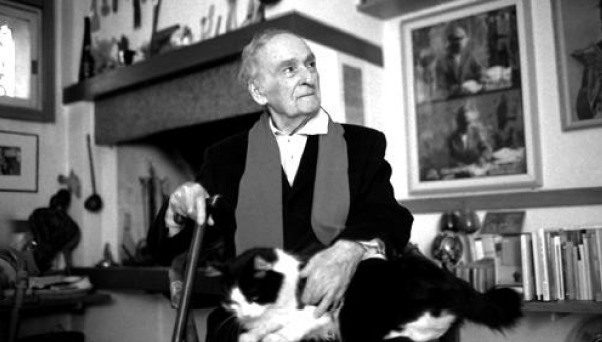But May shall rise again
Published in: 29. The Career of Freedom
Andrea Zanzotto
Behind each of us is the story of a family. Previous generations give us their talents, their love. Someone gets a vitality that would be enough for more than one person; from someone we inherit a name. Sometimes someone from a family becomes well-known even during earthly life, and people learn about his other relatives only later.
The name Andrea Zanzotto is well known to poetry lovers in many countries.
As early as the first decades of the 20th century, several representatives of the Zanzotto family proved themselves in the field of art, science and poetry. For example, the poet’s father, the artist Giovanni Zanzotto. In Russia, not much is known about him. It might seem that the father remains in the son’s shadow. But his grandson, also Giovanni Zanzotto, a professor of mathematics at a university in Italy, disagrees: “The father is not in the son’s shadow. It’s just that he is less known. ”
The artist Giovanni Zanzotto was born in 1888 in Pieve di Soligo. His creative abilities appeared very early. Until 1915, he worked in Trieste as an artist-decorator. In his political views, he was close to the socialists. In the twenties he continued to work as a miniaturist, decorator and portrait painter, collaborating with his friend Guido Cadorin, the symbolist artist. He participated in the Resistance and in 1946 was elected mayor of Pieve. He taught at various educational institutions. He died in 1960. His creative legacy includes frescoes in churches and chapels, and his valuable portraits and drawings have been preserved in private collections both in Italy and abroad.
His son Andrea was born on October 10, 1921, in Pieve di Soligo (province of Treviso). Already by the age of seven, little Andrea felt a poetry that “grows like a body.” When in 1927 the boy began studying in primary school, thanks to his teacher Marcellina Dalto, he learned to write amazingly quickly and was enrolled in the second grade.
During this period, he felt, as he later said, the pleasure of the musicality of words.
In 1929, he lost his sister Marina, and in 1937, his sister Angela. The pain of these losses marked him for the rest of his life.
In 1936, the first publication of his poems appeared. They did not yet have a unique style.
Andrea began to publish regularly starting in 1951.
In 1939, he entered the Faculty of Literature at the University of Padua. He immersed himself in the study of the work of Baudelaire and Rimbaud, and read Hölderlin, Goethe, Heine, in their original tongue. He graduated from the university in 1942. His thesis was devoted to the work of Grazia Deledda (1871-1936), the Italian writer and Nobel Prize winner in literature. A crater on Venus is named after her.
He was a member of the Resistance. In 1946, he emigrated to Switzerland, and then to France. He returned to Italy in 1947 and began teaching.
In 1959, he married Marisa Michieli, the mother of his sons Giovanni and Fabio.
In the summer of 1976, he began collaborating with Federico Fellini (“Casanova,” “City of Women,” “And the ship is sailing”).
Andrea Zanzotto also wrote for children. “The Story of Barba Zukon” is written in the Veneto dialect.
His poems have been translated into most European languages. Andrea Zanzotto was a laureate of many literary prizes.
He died on October 18, 2011, at the age of 90.
Maybe someday a new galaxy will be named after him.
— Yulia Sventsitskaya
Materials based on: Andrea Zanzotto “Le poesie e prose scelte.” Mondadori, Milano, 2000.
Andrea Zanzotto (1921-2011)
***
“And you are not all-powerful,”
the pale girl says
on May’s birthday.
***
Dust has scattered from the last duel
between blue and green
where horizons collapsed on the grass.
***
The voices of wild bees are barely audible;
everything dreams of a different voyage,
breaking up into small parts.
***
Maybe the icy bees froze like a cloud,
in a transparent, invisible swarm —
disagreeing, the branch sways.
***
Frozen hail hops and skips,
but May shall rise again.
“And I am not all-powerful” —
tapping and tapping on roofs.
***
“May will not arrive,” hum
the insects hiding
in the icy hail, blue and gray
***
And in the middle of May the snowfall doesn’t end.
Who do you want to save?
Who are you stubbornly saving?
***
Why is it so dark every time
in the month of May in this century — in just one month
a whole hundred years of darkness?
Translation from Italian to Russian – Y. Sventsitskaya
Translation Editor – L. Chernyakov
Translation from Russian to English – J. Manteith

Speak Your Mind